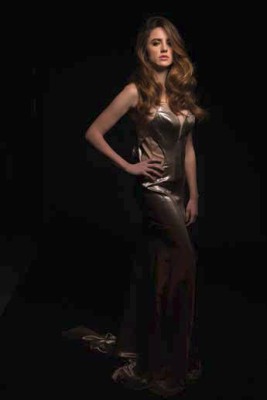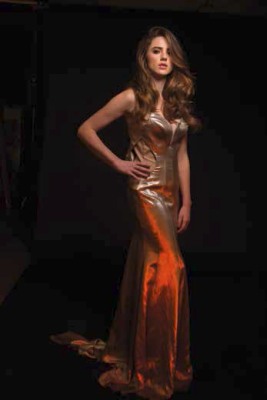articles/Lighting/dressonfire-page2
Dress On Fire by Lindsay Adler - part 2 of 1 2 3 4
by Lindsay Adler Published 01/07/2016

Step 3:
Next, you need to add a second light pointed at the lower half of the subject's body. For this light you will turn OFF the strobe capabilities and only use the modelling light. Here I have used a zoom reflector with barn doors and a red gel for creative effects. This light will be used to illuminate the dress, and I use the barn doors to make sure this light does not hit the subject's face. This is one of the benefits of placing gels on barn doors - you can control the spill of light more precisely.
Now that the strobe capabilities are turned off and the ambient light in the room is eliminated, be sure the modelling light of this second light is turned up to full power.
If you take a photograph while shooting at a 'normal' studio shutter speed (around 1/200 sec) you will see almost no light added to the bottom of the dress. This is because your exposure does not let in enough ambient light to record the colour of the dress. In the next step, we will change this.

Step 4:
In order to achieve see colour/detail on the bottom of the dress, you will need to use a long shutter speed (aka 'dragging the shutter') to allow the background light to register in your exposure.
By using a longer shutter speed, in this case 1/4sec or 1/8sec, you leave the shutter open long enough to pick up the light from the modelling light.
With the longer exposure in this image you can see the red illumination registering on the bottom of the dress.
Please Note:
There is more than one page for this Article.
You are currently on page 2
- Dress On Fire by Lindsay Adler page 1
- Dress On Fire by Lindsay Adler page 2
- Dress On Fire by Lindsay Adler page 3
- Dress On Fire by Lindsay Adler page 4
1st Published 01/07/2016
last update 09/12/2022 14:53:27
More Lighting Articles
There are 0 days to get ready for The Society of Photographers Convention and Trade Show at The Novotel London West, Hammersmith ...
which starts on Wednesday 14th January 2026



